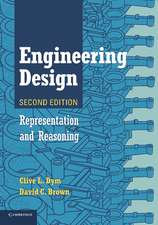Information Ergonomics: A theoretical approach and practical experience in transportation
Editat de Michael Stein, Peter Sandlen Limba Engleză Paperback – 13 apr 2014
This book consists of two closely intertwined parts. The first, theoretical part defines the concept of an information system, followed by an explanation of action regulation as well as cognitive theories to describe man information system interaction. A comprehensive description of information ergonomics concludes the theoretical approach.
In the second, practically oriented part of this book authors from industry as well as from academic institutes illustrate the variety of current information systems taken from different fields of transportation, i.e. aviation, automotive, and railroad. The reader thus gains an overview of various applications and their context of use as well as similarities and differences in design. This does not only include a description of the different information systems but also places them in the context of the theories and models, which were presented in the first part of this book.
| Toate formatele și edițiile | Preț | Express |
|---|---|---|
| Paperback (1) | 558.33 lei 38-44 zile | |
| Springer Berlin, Heidelberg – 13 apr 2014 | 558.33 lei 38-44 zile | |
| Hardback (1) | 645.28 lei 6-8 săpt. | |
| Springer Berlin, Heidelberg – 30 mar 2012 | 645.28 lei 6-8 săpt. |
Preț: 558.33 lei
Preț vechi: 697.91 lei
-20% Nou
Puncte Express: 837
Preț estimativ în valută:
106.85€ • 111.14$ • 88.21£
106.85€ • 111.14$ • 88.21£
Carte tipărită la comandă
Livrare economică 10-16 aprilie
Preluare comenzi: 021 569.72.76
Specificații
ISBN-13: 9783642439032
ISBN-10: 3642439039
Pagini: 268
Ilustrații: XII, 256 p.
Dimensiuni: 155 x 235 x 14 mm
Greutate: 0.38 kg
Ediția:2012
Editura: Springer Berlin, Heidelberg
Colecția Springer
Locul publicării:Berlin, Heidelberg, Germany
ISBN-10: 3642439039
Pagini: 268
Ilustrații: XII, 256 p.
Dimensiuni: 155 x 235 x 14 mm
Greutate: 0.38 kg
Ediția:2012
Editura: Springer Berlin, Heidelberg
Colecția Springer
Locul publicării:Berlin, Heidelberg, Germany
Public țintă
ResearchCuprins
The Field of Information Systems.- Information Ergonomics.- Human aspect of information ergonomics.- Conflict between Ergonomic and Design.- Information Systems in Transport today.- Potential of Information Systems.
Notă biografică
Dr. Stein received his Ph.D. from University of Wuppertal department safety and security in 2001. Since 2004 he has been head of the division engineering psychology at the German Air Force Institute of aviation medicine. At 2007 the University of Wuppertal, department Ergonomics awarded him the academic degree of an associate professor. His current research is focused on investigating cockpit concepts for different military aircraft in close collaboration with EADS.
Dr. Sandl received his diploma in technical physics in 1988 at the Technical University of Munich. After one year as test engineer at MBB flight test, he continued his scientific career at the Max Planck Gesellschaft and received his Ph.D. in 1993 at the University of Bayreuth. Since 1996 he works at, and since 1999 he lead the department of Human Factors Engineering at Cassidian, an EADS company. Currently he is working on new HMI concepts for manned and unmanned military air systems.
Dr. Sandl received his diploma in technical physics in 1988 at the Technical University of Munich. After one year as test engineer at MBB flight test, he continued his scientific career at the Max Planck Gesellschaft and received his Ph.D. in 1993 at the University of Bayreuth. Since 1996 he works at, and since 1999 he lead the department of Human Factors Engineering at Cassidian, an EADS company. Currently he is working on new HMI concepts for manned and unmanned military air systems.
Textul de pe ultima copertă
The variety and increasing availability of hypermedia information systems, which are used in stationary applications like operators’ consoles as well as mobile systems, e.g. driver information and navigation systems in automobiles form a foundation for the mediatization of the society. From the human engineering point of view this development and the ensuing increased importance of information systems for economic and private needs require careful deliberation of the derivation and application of ergonomics methods particularly in the field of information systems.
This book consists of two closely intertwined parts. The first, theoretical part defines the concept of an information system, followed by an explanation of action regulation as well as cognitive theories to describe man information system interaction. A comprehensive description of information ergonomics concludes the theoretical approach.
In the second, practically oriented part of this book authors from industry as well as from academic institutes illustrate the variety of current information systems taken from different fields of transportation, i.e. aviation, automotive, and railroad. The reader thus gains an overview of various applications and their context of use as well as similarities and differences in design. This does not only include a description of the different information systems but also places them in the context of the theories and models, which were presented in the first part of this book.
This book consists of two closely intertwined parts. The first, theoretical part defines the concept of an information system, followed by an explanation of action regulation as well as cognitive theories to describe man information system interaction. A comprehensive description of information ergonomics concludes the theoretical approach.
In the second, practically oriented part of this book authors from industry as well as from academic institutes illustrate the variety of current information systems taken from different fields of transportation, i.e. aviation, automotive, and railroad. The reader thus gains an overview of various applications and their context of use as well as similarities and differences in design. This does not only include a description of the different information systems but also places them in the context of the theories and models, which were presented in the first part of this book.
Caracteristici
Practical solutions for information systems design Covers a wide range from software ergonomics to safety critical guidance-systems (eg. airports, subways) Includes supplementary material: sn.pub/extras





















